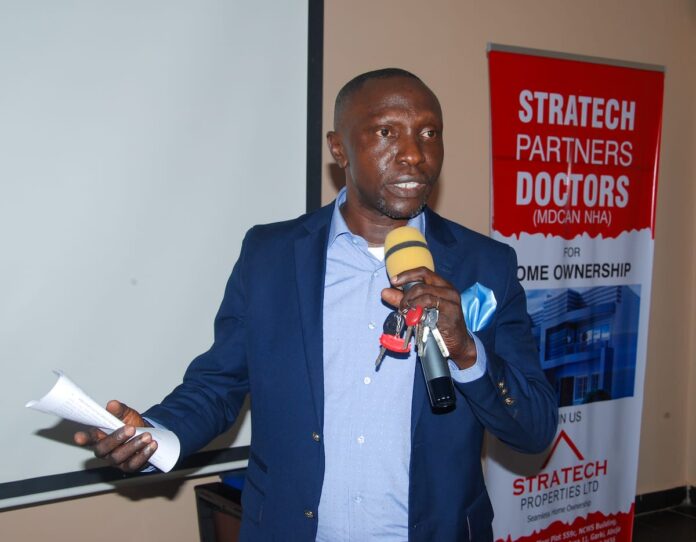CEO rates Nigeria’s housing deficit high
Story from Abah ADAH, Abuja
Nigeria’s housing deficit which has been a subject of public discourse in recent times has been rated as one of the highest around the world.
The managing director/chief executive officer (CEO), Stratech Properties Ltd, Amb. Moses Kolawole Obisesan, who made the observation during an interview in Abuja said the high level of the deficit is evident in the fact that many Nigerians are living in slums, more of which are springing up at a geometric rate.
READ ALSO: Why Taraba 80 housing units estate is named after Buhari – Minister
“A lot of Nigerians are living in slums. There had been arguments back and forth about the level of housing deficit in the country which I don’t want to be part of. But the point is that there is a huge deficit, if you want to believe that there is, then go to Mpape in Abuja; you would see how people are living in slums there, millions of Nigerians living in slums, in dehumanising conditions.
“That Mpape you are seeing is a time bomb because one day somebody would wake up and say he wants to clear that place; where are you going to push all these people to. Go to Mabushi here, you see slum settlement, to Garki, you see same, and they said they are integrating, what are you integrating; it’s your slums spreading faster than the rate at which houses are produced in the country,” he said.
On how to go about closing the huge housing gap, the expert said it requires seamless collaboration between the federal and state governments on one hand and the private sector (the developers) on the other hand, as none of the three can claim it would succeed alone.
According to him, the major bane to having low-cost houses for common Nigerians is access to land, maintaining that as long as securing land is as difficult and expensive as is the case now, it is equally difficult for anyone who has gone through the expenses of acquiring land and building houses to put it out at what may be the price affordable to many.
“Basically the housing issue in Nigeria can’t be solved by the government alone; it requires a very collaboration between the government and the private sector. What that means is that we have to work together; leave it to the government alone it won’t succeed and leave it to the private sector alone, it won’t succeed. Land usually takes about 30 to 40% of the cost of building, sometimes a lot more, and governors are the custodians of the land.
“It then means that if an average developer wants to develop a low-cost house, the land must be very cheap if not almost free. Once the land is expensive, then you are just joking; that house cannot be social housing or what people call affordable housing.
He said a situation where getting approval for a Certificate of Occupancy (C of O) becomes a nightmare due to the stringent process attached is unhealthy for a country that has housing issues to contend with.
The CEO argued that what people usually refer to as affordable housing is actually social housing, stressing that the latter is the one developed for the poor in society to also own good living houses according to their capacity while the affordable housing is a relative term, depending on the category of people being talked about as different kinds of houses are affordable to different categories of people.
“I think first of all we have to differentiate between what is social housing and what is affordable housing. Social housing is the one developed for the poor and it’s the responsibility of govt to make that happen; what that simply means is that the government gives me a free land, knowing that I am going to use very basic materials, especially those that are available in the country to construct houses for the use and for the good of Nigerians. It’s a social responsibility that should be taken seriously by the government.
“On the other hand, affordable is a relative term, while a house of N15 million cannot be affordable to many, it can be affordable to others who have the means.
“I give you a very simple scenario; you want to construct houses for maybe civil servants or artisans who earn around N50,000 less, then it means the land has to come almost free to the developer, that’s no one; if it is expensive, somebody must pay, and the only person to pay is the subscribers, or the off-takers as some may love to call them, or buyers. So if a state government says in my state I want to produce houses in their thousands for the low-income earners in the state, such is actually social housing, not affordable housing because that is a relative term,” he said.
Commending the recent statement credit to the new management of the Federal Mortgage Bank of Nigeria (FMBN), Amb.
Obisesan said that would go a long way towards solving the issue of housing deficit as there would be enough funds for the institution to give out tax-paying Nigerians.
“There is a particular programme that the federal government is trying to do nationwide in collaboration with the Real Estate Developers Association of Nigeria (REDAN) and they are telling the states to make land available in all the 774 local government areas across the country, something like that. Such collaborations can work. How? Let the state, working with the local governments give the land out.
“Now when the lands are available, let the federal government, through the mortgage scheme, give a mortgage to Nigerians. And let’s not pay lip service. I love what I heard, that FMBN was recapitalising from N5 billion to N500 billion, fantastic! That’s the kind of thing that we should be seeing actually; recapitalisation of a major institution that has the sole responsibility of giving mortgages to Nigerians.
“When their total figure was N5 billion, how many Nigerians could they possibly give. Since the inception of FMBN till today, how many have they been able to give? How much do they even have to give? So you have millions of Nigerians contributing, with only a very few being able to access it. It means the recapitalisation of FMBN is perfect. Let that take place quickly.
“So there is a need for greater synergy; financing being driven by the federal government, the land being brought on board by the state government, then expertise being rendered by the developers. Now if the three parties don’t play their roles it won’t happen,” he said.
Follow the Neptune Prime channel on WhatsApp:
Do you have breaking news, interview request, opinion, suggestion, or want your event covered? Email us at neptuneprime2233@gmail.com





